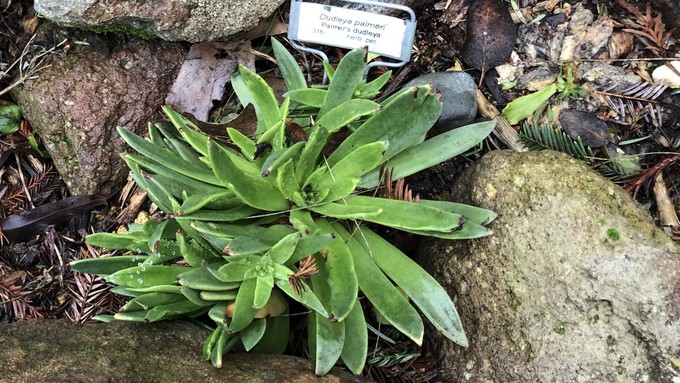
El Dorado County master gardeners present free workshop

Palmer's dudleya is an example of a California native succulent that would do well in a small garden or in a container. Kathy Morrison
Interested in native plants but think you don’t have enough space? Meet some compact California natives that thrive in smaller spaces or containers during a free workshop, “There's a Native Plant for That: Gardening with Native Plants.”
Set for 9 a.m. Saturday, Sept. 7, this three-hour workshop will be held at Blackstone Community Center in El Dorado Hills and is open to interested gardeners from throughout the region.
Hosted by the UCCE master gardeners of El Dorado County, this class also features the expertise of members of the California Native Plant Society. They’ll cover the basics of native gardening in all spaces, big or small with special emphasis on smaller areas.
“Do you love native plants and wonder how you can enjoy them on your patio or in your smaller garden?” ask the master gardeners. “Join master gardeners and California Native Plant Society (CNPS) members Dolores Morrison, Kathleen Barco, and Ola Jane Gow and discover how to evaluate your yard to establish a native landscape, how to select and maintain plants, how to group plants by water needs, and, if you only have a small space, the best native plants for containers.
“There are native plants for every environment,” they add. “Come and learn with us!”
Registration is requested, though not required for this free class. Find the link here under “Master Gardener Calendar”: https://mgeldorado.ucanr.edu/.
Blackstone Community Center is located at 1461 Blackstone Parkway, El Dorado Hills.
Comments
0 comments have been posted.Sacramento Digs Gardening to your inbox.
Food in My Back Yard Series
May 6: Maintain soil moisture with mulch for garden success
April 29: What's (already) wrong with my tomato plants?
April 22: Should you stock up on fertilizer? (Yes!)
April 15: Grow culinary herbs in containers
April 8: When to plant summer vegetables
April 1: Don't be fooled by these garden myths
March 25: Fertilizer tips: How to 'feed' your vegetables for healthy growth
March 18: Time to give vegetable seedlings some more space
March 11: Ways to win the fight against weeds
March 4: Potatoes from the garden
Feb. 25: Plant a fruit tree now -- for later
Feb. 18: How to squeeze more food into less space
Feb. 11: When to plant? Consider staggering your transplants
Feb. 4: Starting in seed starting
Sites We Like
Garden Checklist for week of May 11
Make the most of the lower temperatures early in the week. We’ll be back in the 80s by Thursday.
* Plant, plant, plant! It’s prime planting season in the Sacramento area. Time to set out those tomato transplants along with peppers and eggplants. Pinch off any flowers on new transplants to make them concentrate on establishing roots instead of setting premature fruit.
* Direct-seed melons, cucumbers, summer squash, corn, radishes, pumpkins and annual herbs such as basil.
* Harvest cabbage, lettuce, peas and green onions.
* In the flower garden, direct-seed sunflowers, cosmos, salvia, zinnias, marigolds, celosia and asters. (You also can transplant seedlings for many of the same flowers.)
* Plant dahlia tubers.
* Transplant petunias, marigolds and perennial flowers such as astilbe, columbine, coneflowers, coreopsis, dahlias, rudbeckia and verbena.
* Keep an eye out for slugs, snails, earwigs and aphids that want to dine on tender new growth.
* Feed summer bloomers with a balanced fertilizer.
* For continued bloom, cut off spent flowers on roses as well as other flowering plants.
* Add mulch to the garden to maintain moisture. Mulch also cuts down on weeds. But don’t let it mound around the stems or trunks of trees or shrubs. Leave about a 6-inch-to-1-foot circle to avoid crown rot or other problems.
* Remember to weed! Pull those nasties before they set seed.
* Water early in the day and keep seedlings evenly moist.